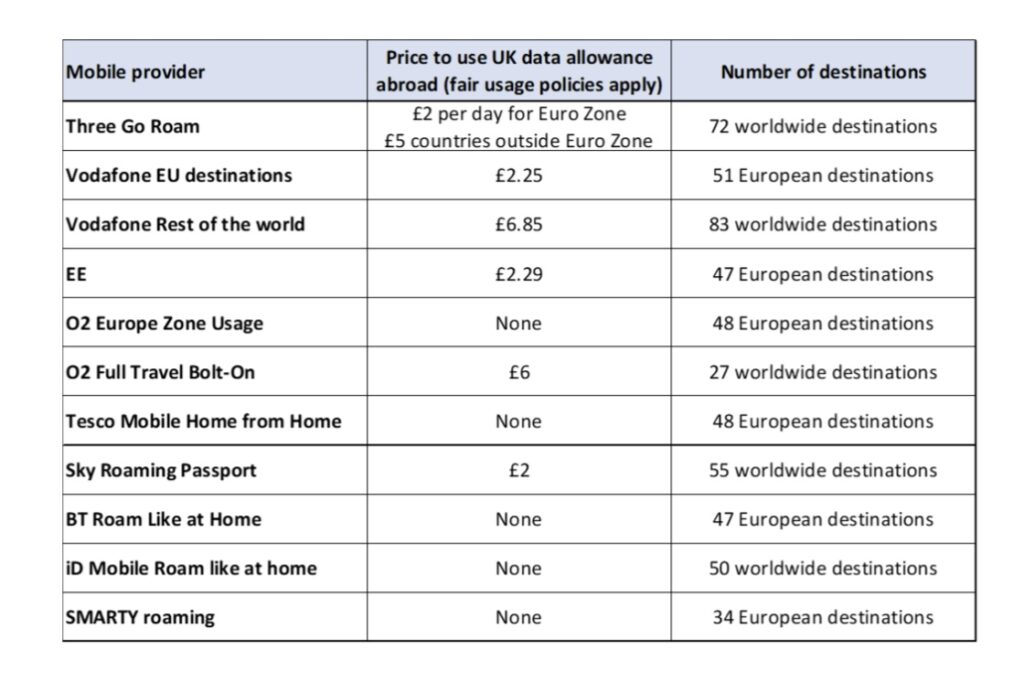SUMMER HOLS BILL SHOCK WITH 46M IN THE DARK ABOUT REMOVAL OF EU PROTECTIONS

A third (32%) of Brits are planning to use their mobiles abroad[5]. However, confusion around roaming policies is leaving millions vulnerable to facing bill shock, according to new research from Uswitch.com, the comparison and switching service.
With roaming policies ranging dramatically across different destinations, providers and plans, holidaymakers face real uncertainty using mobiles abroad this summer. Brits have had to fork out approximately £539m in unexpected roaming costs over the past 12 months alone.[1]
Only 17% of Brits know that a compulsory £45 cap, imposed by the EU to protect consumers from unexpected roaming charges, has now expired’. This leaves 46 million (83%) adults in the dark about their roaming protections. [2]
The removal of the £45 cap means there are virtually no guaranteed roaming protections left for consumers. While some networks, such as Sky Mobile, giffgaff, O2 and Three have kept this worldwide cap voluntarily, others, such as Tesco Mobile, have already scrapped it.
Even where data roaming caps are still in place, it’s important to note these caps only cover data usage. Phone calls and texts are not included and can easily rack up extortionate bills.
For example, Sky Mobile customers heading to the Maldives or Seychelles would have to pay a whopping £8.64 every minute for calls to local or UK mobiles and landline numbers. That’s approximately £130 for a 15-minute phone call.
Although many customers sign up to bolt-on services that make their UK allowance available abroad, these are typically limited to popular travel destinations.
Those using mobile internet outside the EU, and other common holiday destinations, will often be prompted to purchase a data add-on on arrival. However, these regularly include miniscule data allowances for extortionate prices. For example, with EE, a measly 50MB will cost you £65.32 in Costa Rica, Ghana, Vietnam and dozens of other destinations.
Uswitch mobile expert, Rehan Ali comments: “Anyone travelling abroad from the UK should be wary of potential shock costs, even if they think roaming is included in their tariff. These costs can sometimes be incredibly expensive, so it’s vital that customers research ahead of their trip and put measures in place to avoid a sky-high bill.
“The safest option is to manually apply a monthly spending cap before travelling for each account that will be used abroad. This is particularly important for children and teenagers with access to a phone, as one in 10 parents say their kids have been responsible for an unexpected roaming bill.
“Given how confusing these policies and plans can be, the key piece of advice for anyone looking to enjoy some time abroad this summer is to thoroughly research your plan ahead of time and speak to your provider to avoid any nasty shocks.”
For more information on roaming, plus all the best plans for travelling abroad, please visit Uswitch.com.
Top tips to reduce your roaming bills:
Download any maps, films and music before travelling to avoid data costs abroad. An hour of Google Maps will only eat up 5MB. However, streaming an HD movie for the same time will use about 2GB – 400 times as much.
Set up your own spending cap with your provider to avoid any surprise bills. If you’re paying for a bundle to roam abroad, you may not have the same data allowances as you do in the UK. So check your provider’s fair usage policy to confirm exactly what you can use before you incur extra charges.
Even receiving a voicemail abroad can cost you. If your provider charges for this, call them before you travel and get it switched off.
Use hotel and cafe Wi-Fi connections whenever possible. You can also enable Wi-Fi calling or use services like Whatsapp to make audio calls without using your minutes. Make sure access points are secure before logging on and avoid activities like online banking on public networks.
Flight mode is not just for when you’re up in the air, although it will stop you from connecting to other networks while flying across different countries. Activating it in destinations with high roaming fees can remind you to watch your usage and save you from unexpected costs.
Consider buying a no-contract one-month SIM only deal that will cover you for your time away. Lebara, which runs off the Vodafone network, offers a 5GB monthly SIM only contract for £4.95, which comes with free roaming in the EU and India.
Consider whether an eSIM, which means an embedded SIM card, could work out cheaper at your destination. An eSIM makes it much easier to switch mobile networks and avoid high roaming charges when travelling outside of the UK. Local eSIM bundles are typically cheaper than data roaming packages from the big four networks, or when paying per MB while abroad.




